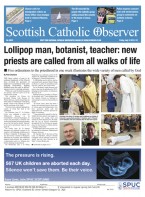August 24 | ![]() 0 COMMENTS
0 COMMENTS ![]() print
print

Our attitude towards wealth
— Fr Ronald Rolhesier
The rich are getting richer, and we are almost beyond surprise at how rich that is.
Every day, our newspapers, our televisions, and the internet, report financial compensations that, even just a generation ago, were unimaginable: Corporate executives receiving a hundred million dollar bonuses, an athlete signing a contract for a $100million, entertainers signing contracts for tens of millions, people in information technology earning billions, and ordinary folks everywhere joining the millionaire club.
And what’s our reaction? Difficult to judge. We express indignation and protest that this is out of proportion, even as we nurse a not-so-secret envy: I wish it was me!
We adore the rich and famous, pure and simple, and in the end, despite our envy, we grant them their due: Good for them! They worked for it. They have the talent. They deserve all they get!
But how should we view being rich from a faith perspective? Jesus warned that riches are dangerous, dangerous to the soul and dangerous to society. So what should be our attitude towards having wealth, both as this pertains to the very rich and as it pertains to us?
First, it is good to avoid a number of things: To begin with, we must never idealise poverty and see wealth as a bad thing in itself. God is rich, not poor, and Heaven will not be a place of poverty. Poverty is something to be overcome, eradicated. The poor do not enjoy being poor. Next, we must avoid too-quickly politicising both poverty and wealth. Our lens must always be moral rather than political, though obviously both wealth and poverty have huge political implications. Finally, before attacking the possession of wealth, we must ensure that we are free from embittered moralising which, whatever its moral guise, is little more than envy.
What principles should guide us in terms of an attitude towards wealth?
Underlying everything else, we must always keep in mind Jesus’ warning that the possession of wealth is dangerous, that it is hard for a rich person to enter the Kingdom of Heaven. Moreover that warning should be a huge aid in helping us to accept some other principles:
First: The possession of wealth is not a bad thing of itself; it is how we use it and what it can do to our hearts that can be bad. Jesus makes a distinction between the generous rich and the miserly rich. The former are good because they imitate God, the latter are bad. When we are generous, particularly in a very prodigious way, riches won’t close our hearts. But the reverse is also true. All miserliness, all stinginess, all lack of generosity closes our hearts in ways that make it hard to enter the kingdom of heaven, or genuine human community to put in purely human terms.
And so the challenge for all of us who are rich in any way is to continually give our wealth away. We need to do this, not because the poor need what we give them, though they do; we need to do this so that we can remain healthy. Philanthropy, of every kind, is more about the health of the one giving than the health of the one receiving. The generous rich can inherit the kingdom, the miserly rich cannot. The poor are everyone’s ticket into Heaven—and to human health.
Finally, this too must always be kept in mind as we view wealth, both our own and that of the very rich. What we have is not our own, it is given to us in trust. God is the sole owner of all that is and the world properly belongs to everyone. What we claim as our own, private property, is what has been given to us in trust, to steward for the good of everyone. It is not really ours.
Further still, we need to remember that it was not just our own ingenuity and hard work that gave us what we view as our own. The fruits of our labor are also the fruits of other peoples’ labour. We too easily lose sight of that. Here’s how Bill Gates Sr puts it: “Society has an enormous claim upon the fortunes of the wealthy. This is rooted not only in most religious traditions, but also in an honest accounting of society’s substantial investment in creating fertile ground for wealth-creation. Judaism, Christianity, and Islam all affirm the right of individual ownership and private property, but there are moral limits imposed on absolute private ownership of wealth and property. Each tradition affirms that we are not individuals alone but exist in community—a community that makes claims on us. The notion that ‘it is all mine’ is a violation of these teachings and traditions. Society’s claim on individual accumulated wealth is… rooted in the recognition of society’s direct and indirect investment in the individual’s success. In other words, we didn’t get there on our own.” (Sojourners, January-February, 2003)
Indeed, none of us did! If we remember that we will more easily be generous.










